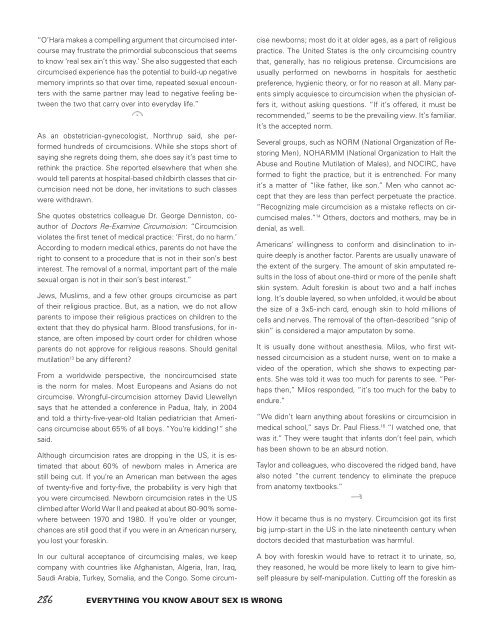You also want an ePaper? Increase the reach of your titles
YUMPU automatically turns print PDFs into web optimized ePapers that Google loves.
“O’Hara makes a compelling argument that circumcised intercourse<br />
may frustrate the primordial subconscious that seems<br />
to know ‘real sex ain’t this way.’ She also suggested that each<br />
circumcised experience has the potential to build-up negative<br />
memory imprints so that over time, repeated sexual encounters<br />
with the same partner may lead to negative feeling between<br />
the two that carry over into everyday life.”<br />
As an obstetrician-gynecologist, Northrup said, she performed<br />
hundreds of circumcisions. While she stops short of<br />
saying she regrets doing them, she does say it’s past time to<br />
rethink the practice. She reported elsewhere that when she<br />
would tell parents at hospital-based childbirth classes that circumcision<br />
need not be done, her invitations to such classes<br />
were withdrawn.<br />
She quotes obstetrics colleague Dr. George Denniston, coauthor<br />
of Doctors Re-Examine Circumcision: “Circumcision<br />
violates the first tenet of medical practice: ‘First, do no harm.’<br />
According to modern medical ethics, parents do not have the<br />
right to consent to a procedure that is not in their son’s best<br />
interest. The removal of a normal, important part of the male<br />
sexual organ is not in their son’s best interest.”<br />
Jews, Muslims, and a few other groups circumcise as part<br />
of their religious practice. But, as a nation, we do not allow<br />
parents to impose their religious practices on children to the<br />
extent that they do physical harm. Blood transfusions, for instance,<br />
are often imposed by court order for children whose<br />
parents do not approve for religious reasons. Should genital<br />
mutilation 13 be any different?<br />
From a worldwide perspective, the noncircumcised state<br />
is the norm for males. Most Europeans and Asians do not<br />
circumcise. Wrongful-circumcision attorney David Llewellyn<br />
says that he attended a conference in Padua, Italy, in 2004<br />
and told a thirty-five-year-old Italian pediatrician that Americans<br />
circumcise about 65% of all boys. “You’re kidding!” she<br />
said.<br />
Although circumcision rates are dropping in the US, it is estimated<br />
that about 60% of newborn males in America are<br />
still being cut. If you’re an American man between the ages<br />
of twenty-five and forty-five, the probability is very high that<br />
you were circumcised. Newborn circumcision rates in the US<br />
climbed after World War II and peaked at about 80-90% somewhere<br />
between 1970 and 1980. If you’re older or younger,<br />
chances are still good that if you were in an American nursery,<br />
you lost your foreskin.<br />
In our cultural acceptance of circumcising males, we keep<br />
company with countries like Afghanistan, Algeria, Iran, Iraq,<br />
Saudi Arabia, Turkey, Somalia, and the Congo. Some circumcise<br />
newborns; most do it at older ages, as a part of religious<br />
practice. The United States is the only circumcising country<br />
that, generally, has no religious pretense. Circumcisions are<br />
usually performed on newborns in hospitals for aesthetic<br />
preference, hygienic theory, or for no reason at all. Many parents<br />
simply acquiesce to circumcision when the physician offers<br />
it, without asking questions. “If it’s offered, it must be<br />
recommended,” seems to be the prevailing view. It’s familiar.<br />
It’s the accepted norm.<br />
Several groups, such as NORM (National Organization of Restoring<br />
Men), NOHARMM (National Organization to Halt the<br />
Abuse and Routine Mutilation of Males), and NOCIRC, have<br />
formed to fight the practice, but it is entrenched. For many<br />
it’s a matter of “like father, like son.” Men who cannot accept<br />
that they are less than perfect perpetuate the practice.<br />
“Recognizing male circumcision as a mistake reflects on circumcised<br />
males.” 14 Others, doctors and mothers, may be in<br />
denial, as well.<br />
Americans’ willingness to conform and disinclination to inquire<br />
deeply is another factor. Parents are usually unaware of<br />
the extent of the surgery. The amount of skin amputated results<br />
in the loss of about one-third or more of the penile shaft<br />
skin system. Adult foreskin is about two and a half inches<br />
long. It’s double layered, so when unfolded, it would be about<br />
the size of a 3x5-inch card, enough skin to hold millions of<br />
cells and nerves. The removal of the often-described “snip of<br />
skin” is considered a major amputaton by some.<br />
It is usually done without anesthesia. Milos, who first witnessed<br />
circumcision as a student nurse, went on to make a<br />
video of the operation, which she shows to expecting parents.<br />
She was told it was too much for parents to see. “Perhaps<br />
then,” Milos responded, “it’s too much for the baby to<br />
endure.”<br />
“We didn’t learn anything about foreskins or circumcision in<br />
medical school,” says Dr. Paul Fliess. 16 “I watched one, that<br />
was it.” They were taught that infants don’t feel pain, which<br />
has been shown to be an absurd notion.<br />
Taylor and colleagues, who discovered the ridged band, have<br />
also noted “the current tendency to eliminate the prepuce<br />
from anatomy textbooks.”<br />
How it became thus is no mystery. Circumcision got its first<br />
big jump-start in the US in the late nineteenth century when<br />
doctors decided that masturbation was harmful.<br />
A boy with foreskin would have to retract it to urinate, so,<br />
they reasoned, he would be more likely to learn to give himself<br />
pleasure by self-manipulation. Cutting off the foreskin as<br />
286 EVERYTHING YOU KNOW ABOUT SEX IS <strong>WRONG</strong>


